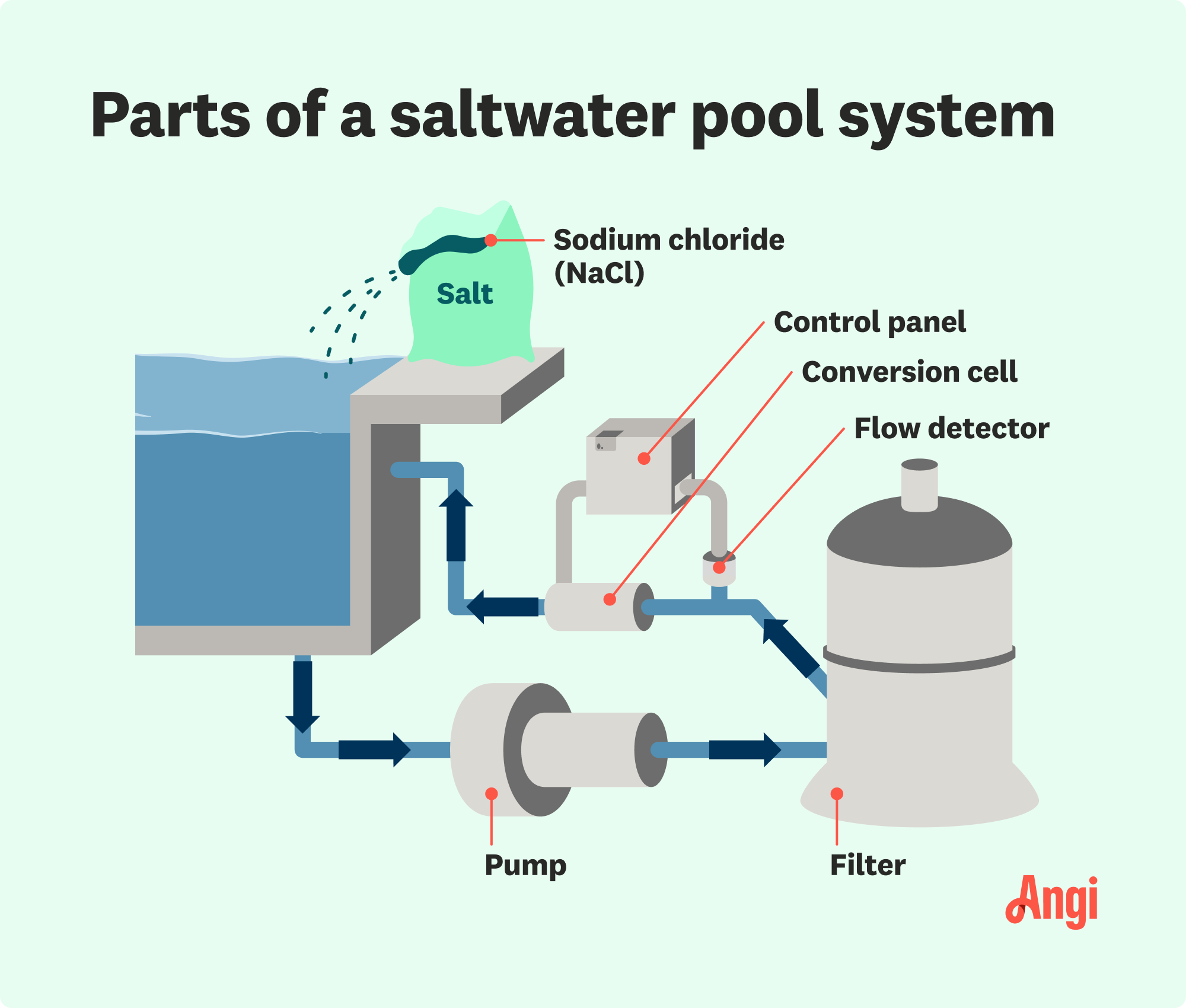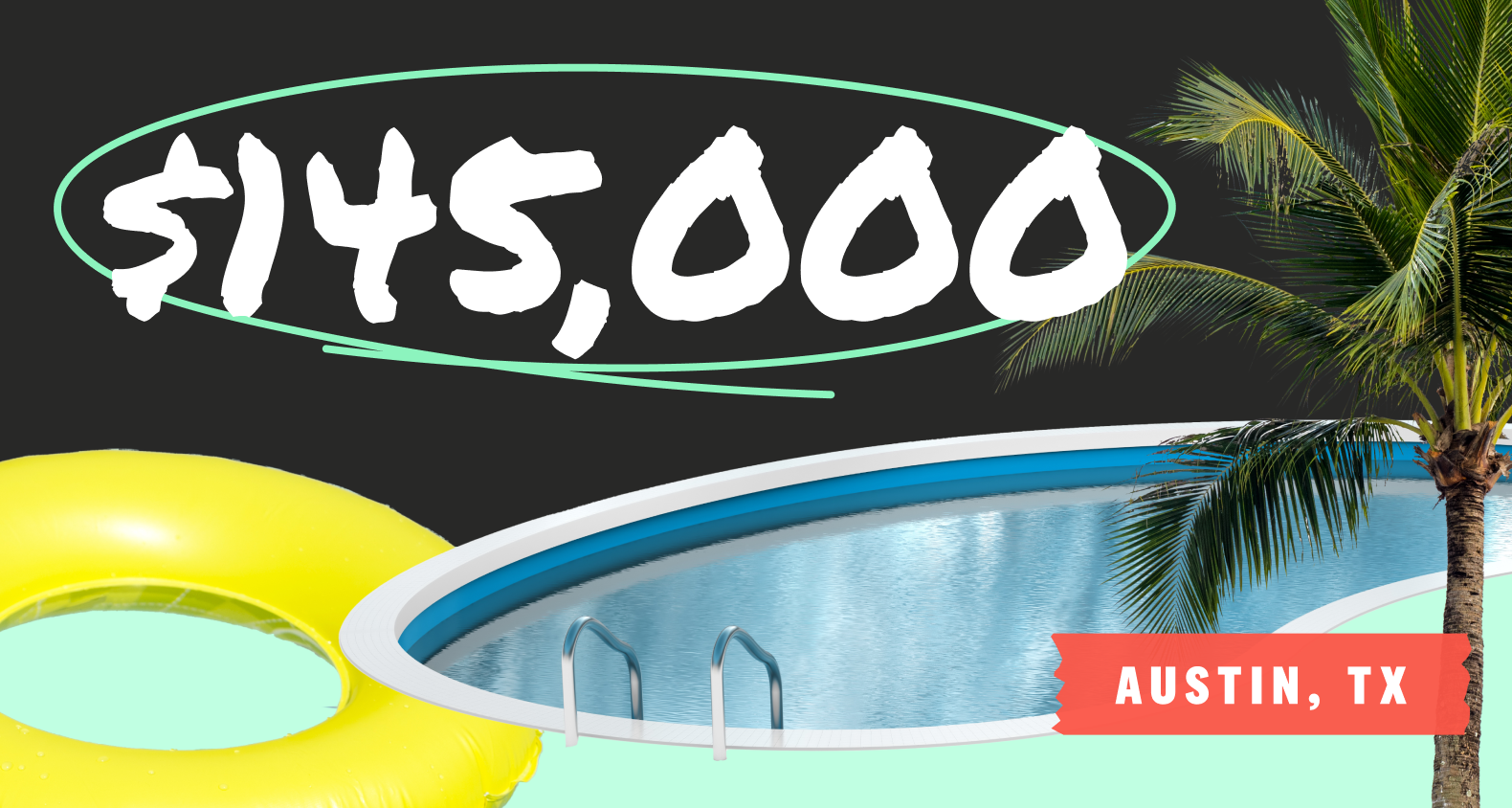Saltwater Pool Conversion: Pros, Cons, and How to Do It
Why this upgrade is a stroke of genius


Saltwater pools have less chlorine and fewer irritating chloramines.
Saltwater pools don’t irritate eyes and lungs or dry out skin and hair as much as chlorine pools.
Unless you’re an experienced DIYer, you should hire a pro to convert your pool.
To convert, you’ll need to balance water, add salt, and install the chlorinator control panel and salt cell.
You love to swim but don’t like how irritated your skin and eyes get after laps in your standard chlorinated pool. Even worse, the harsh chemicals worsen your allergy symptoms and give your blonde hair a green tinge. Enter saltwater pools, which can solve these problems. Read on for the pros and cons of saltwater pools and the basics behind a saltwater pool conversion.
What Are Saltwater Pools?
Although the name might suggest otherwise, saltwater pools contain a small amount of chlorine to disinfect the water. The difference between a saltwater pool and a standard pool is that the chlorine appears in much smaller quantities, and the salt is actually responsible for creating the chlorine.
Here’s how saltwater pools work: At the beginning of the season, you add bulk salt (sodium chloride) to pool water. This salty water is drawn into a chlorinator whose salt cell component converts it into chlorine via electrolysis. This small amount of chlorine then cleans the rest of the water.
Pros and Cons of a Saltwater Pool
Saltwater pools come with some serious upsides, but they’re not for everyone. There are some drawbacks to consider before you dive into a saltwater pool conversion.
Pros of a Saltwater Pool Conversion
Saltwater pools offer many advantages, most importantly a reliance on fewer harsh pool cleaning chemicals, like chlorine and bromine. The lower levels of chlorine and chloramines (irritating chlorine byproducts) result in these upsides.
Health Benefits
Thanks to lower levels of chloramines, saltwater pools don’t irritate eyes and lungs or dry out skin and hair nearly as much as a standard chlorinated pool might. They’re also less likely to cause health problems that can result from frequent exposure to chloramines, like coughing, asthma symptoms, rashes, and allergic rhinitis.
Additionally, saltwater pools are much less likely to turn blonde hair green. The interaction between copper (in pool algaecides) and chlorine causes this issue—it’s not as common of a side effect with saltwater pools, which have significantly less chlorine.
More Safety
With a saltwater pool, you won’t need to store large quantities of dangerous concentrated chemicals like chlorine or bromine. You’ll only need to add salt once per year.
Less Corrosive
The chlorine in standard pools is what causes bathing suits and towels to fade over time, and it even slowly degrades vinyl pool liners and other pool finishes. Since saltwater pools contain much lower chlorine levels, you’re less likely to see that fading on your clothes. Your pool liner might also last longer since there’s less of that corrosive chemical in your water.
Less Maintenance
If you’re like most pool owners, the biggest downside to owning a pool is the maintenance it requires. With a standard pool, you’ll need to test water levels two to three times a week and balance the contents. You’ll still need to test with a saltwater pool, but you can get away with doing it less frequently since your pool equipment generates chlorine for you. You also won’t need to lower the pH of your pool as often.
Additionally, saltwater pools need less vacuuming and cleaning because salt naturally prevents algae from forming.
Cons of a Saltwater Pool Conversion
Saltwater pool conversion does come with some downsides, which you should consider before making the switch.
Initial Expense
Unfortunately, you can’t just add salt to your standard pool. You’ll need additional equipment to convert the salt in the water to chlorine. You can expect to pay between $500 and $3,200 for the electrolytic chlorine generator required for a saltwater pool conversion, depending on the size of your pool.
Damage to Metal
While saltwater is less corrosive to your pool liner, it can corrode metal, including ladder bolts, diving board brackets, skimmer baskets, light fixture housings, heaters, handrails, galvanized wall panels in vinyl pools, and nearby furniture more quickly than standard pool water. To guard against this galvanic corrosion, you can install zinc anodes in your pool heater or filtration system. The sacrificial zinc will corrode first to prevent oxidation on your other metal components.
How to Convert to a Saltwater Pool

If you’re experienced at handling electrical wires, cutting and gluing PVC pipes, and using basic hand tools, you could do a DIY saltwater pool conversion without a conversion kit. For most homeowners, though, it’s best to hire a local pool repair company.
Here are the basic steps, but check your sodium chlorinator manual for the exact procedure:
Test your pool water for free chlorine, pH, cyanuric acid, alkalinity, calcium hardness, heavy metals, and salt. Then balance the water according to the manufacturer’s directions.
Referring to your chlorinator manual, add enough pool-grade salt to achieve the right concentration. Allow 24 hours for the salt to broadcast across the entire pool.
Turn off the power to your pool equipment. Install the chlorinator controller on a wall near your pool equipment pad.
Wire the controller for power, then install the chlorinator cell. Connect the cell to the controller.
Turn on the pump, check for leaks, and let it run for several hours. Turn on the chlorinator.

How Much Does a Saltwater Pool Conversion Cost?
You can expect to pay somewhere between $500 and $3,200 for your saltwater pool conversion equipment, depending on how large your pool is. A good portion of this pool remodel cost—between $100 and $1,800—will go toward the chlorinator and the salt cells inside. You can expect to pay between $300 and $500 for the labor to install the equipment if you’re not doing a DIY pool conversion.
Additionally, you’ll need to purchase bags of salt, which can cost between $50 and $250, depending on the size of your pool. Generally speaking, you’ll need around a pound of salt for every 30 and 40 gallons of water. The average cost of a 40-lb bag is around $8. The table below includes some average volumes and costs for salt, which you’ll need to replenish annually.
| Pool Volume (gallons) | Pounds of Salt | Average Cost |
|---|---|---|
| 5,000 | 300–400 | $80–$110 |
| 10,000 | 360–480 | $100–$130 |
| 20,000 | 450–600 | $120–$160 |
| 30,000 | 510–680 | $140–$190 |
| 40,000 | 600–800 | $160–$215 |
| 50,000 | 660–880 | $180–$240 |
How to Maintain a Saltwater Pool
Maintaining a saltwater pool is similar to maintaining a standard chlorinated pool but less intensive. The major difference is that you won’t need to add much in the way of chemicals.
Just be sure to check your salt cell for buildup every three months and clean it with hydrochloric acid every 500 hours. Every 3 to 8 years, you’ll need to replace it (at a cost of $200 to $700). It’s also smart to check your rubber O-rings and pump seals for corrosion each month. Regularly test your salt level as well, and use a pool salt calculator to figure out how much salt you need to add.
You can also expect less cleaning than you would with a standard pool, as the salt naturally keeps algae at bay.
Should You Convert to a Saltwater Pool?
Whether or not you should convert to a saltwater pool depends on numerous factors. A saltwater pool conversion might be ideal for you if any of the following apply to you and your home:
You have a family member or friend who frequents your pool and has a respiratory issue like asthma.
Swimmers in your pool frequently complain about dry skin, itchy eyes, or brittle, discolored hair.
You want a pool that requires less intensive cleaning.
You don’t want to store harsh and potentially dangerous chemicals like chlorine.
You want an alternative to chlorine in your pool but aren’t keen on switching to bromine or ozone.
You don’t mind spending between $500 and $3,200 to convert to a saltwater pool in exchange for the other benefits.
You can always ask a pool contractor to help you decide if a saltwater pool is right for you if you’re unsure.
| Saltwater Pools | Standard Pools |
|---|---|
| Fewer chemicals | Requires more chemicals |
| Less maintenance | More maintenance |
| Additional equipment needed | No additional equimpent |
| Less frequent water tests | More frequent water tests |
| Easier on skin/eyes/hair | Harsher on skin/eyes/hair |
| Less chemical smell | Heavy chemical smell |
Dina Cheney contributed to this article.
Frequently Asked Questions
No, you don’t need to drain your pool to convert to a saltwater pool unless you use an antibacterial agent containing polyhexamethylene biguanide to sanitize your pool. If you do, either drain your pool or treat it with a high dose of chlorine afterward. If you treat it, wait several days so the chlorine has a chance to remove the antibacterial agent. Then, go ahead with the conversion.
No, you shouldn’t be able to taste the salt at all since saltwater pools only contain about 10% of the salt you’d find in ocean water. Saltwater pools do create some chlorine, though, so you should still try not to drink the water.
Yes, you can absolutely use a sand filter with a saltwater pool, but you’ll have to make sure you have the right grade of sand to catch smaller particles, just like in a standard pool. To choose the right pool filter, consider the degree of filtration you’ll need. Cartridge or diatomaceous earth filters can remove smaller particles, so they’re better suited for a less chlorinated saltwater pool.





- Swimming Pool Installation
- Pool Liner Replace & Install Companies
- Above Ground Pool Contractors
- Pool Remodeling Companies
- Inground Pool Companies
- Pool Removal Companies
- Inground Pool Repair Companies
- Sauna Companies
- Hot Tub Companies
- Sauna Repair
- Fiberglass Pools
- Pool Designers
- Pool Pump Repair
- Pool Closing Services
- Solar Pool Heater Installers
- The Ultimate Guide to Picking the Right Pool Cleaning Chemicals
- Pool Salt Calculator: Know How Much Salt to Add to Your Pool
- Pros and Cons of Filling In a Pool With Dirt
- How To Clean an Above Ground Pool To Keep It Crystal Clear
- 4 Alternatives to Chlorine in Pools
- 5 Common Pool Care Mistakes You Should Avoid
- 10 Things to Consider When Building a Pool
- The Beginner’s Guide to DIY Pool Maintenance
- Ultimate Salt Water Pool Maintenance Checklist
- Why Is My Pool Green and How Can I Fix It?










